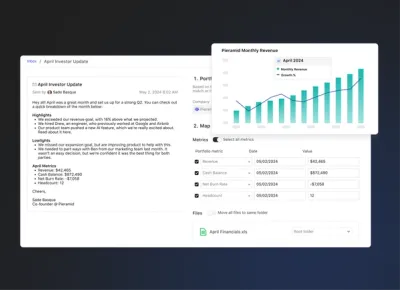
Navigating Investor Feedback: A Guide to Constructive Responses

There are not many people who have been in the role of a startup founder. For many startup founders, this means taking on new roles and responsibilities that they might not have experienced before.
When facing these challenges, it helps to have someone guide you along the way — this can be an investor, peer, mentor, or someone else with experience. Soliciting feedback from the investors around you is a great way to tap into their network and experience to keep moving forward. Investors typically have had experience as operators themselves or the other founders in their portfolio.

Understanding the Value of Investor Feedback
As Seth Godin wrote in Beware of Experience Asymmetry, “There are things you’re going to do just once… In these situations, the institutions and professionals you’re dealing with have significantly more experience than you do…In these asymmetric situations, it’s unlikely that you’re going to outsmart the experienced folks who have seen it all before. It’s unlikely that you’ll outlast them either.
When you have to walk into one of these events, it pays to hire a local guide. Someone who knows as much as the other folks do, but who works for you instead.”
Many of the roles you face as a founder can fall into this bucket — raising capital, going through a merger or acquisition, going through legal counsel, etc. When facing these new roles and challenges, it often helps to find someone around you who does have experience.
If you have investors, this can typically be a great place to start. Many investors have experience as operators but if they don’t, they typically have a large network of founders and other investors. This means that they’ve likely seen the challenges you’re facing, directly or not, before.
Why Does Investor Feedback Matter?
As we mentioned above, investors typically have experiences and a network that will lend useful feedback when it comes to fundraising, hiring, company strategy, etc.
Related Resource: How to Build Trust Through Investor Feedback
Investor feedback can be particularly important when it comes to raising venture capital. At the end of the day, you are pitching investors so welcoming feedback can be a great way to tweak your pitch for future investors.
However, just because an investor offers feedback does not mean it is right for your business. Remember that you know more about your business than any investor so be critical about what feedback you put to use.
Core Principles for Constructive Responses
As we mentioned above, not all feedback will be relevant to your business. However, welcoming a conversation and hearing out their point is a great way to strengthen your investor relationships. Check out a few key principles for constructive responses to investor feedback below:
Active listening
If you are going to solicit feedback from an investor it is important to be respectful and actively listen. This includes hearing out what they have to say, even if you do not agree, and asking follow-up questions as you see fit.
Reflecting and analyzing
Just because an investor offers feedback does not mean you need to take it. At the end of the day, you know your business the best. It is important to reflect and analyze the feedback you receive.
Seeking clarification
Instead of assuming feedback means one thing it is important to seek clarification if there is any confusion. This will not only help you get to the bottom of their suggestion but will demonstrate to them that you are taking their feedback and time seriously.
Collaborative problem solving
If you are seeking feedback from an investor it should be someone you trust and value. By them offering feedback it is an open door to further the conversation and collaborate on the problem you are solving. This can not only lead to a better outcome but a strengthened relationship for future conversations.

5 Strategic Ways to Collect Investor Feedback
Write a transition paragraph that introduces the next section. Feel free to add/remove/adjust the below techniques for gathering feedback
1. One-on-one meetings
One-on-one meetings are likely reserved for investors with whom you have existing relationships. This means that they likely have some familiarity with your business and will be able to offer sound feedback.
Advantages
- No bias from other investors or people in a meeting.
- Make specific asks based on their own skillset/experience.
- More personal and genuine feedback.
Related Resource: The Complete Guide to Investor Reporting and Updates
2. Pitching and Events
Pitching inventors or attending events can be a great way to get feedback from investors who are outside of your network. While they might be new to your business they can offer valuable feedback on how outsiders view your business and your pitch. This will allow you to tweak and improve your communication for future pitches.
Advantages
- Receive feedback based on your pitch and presentation.
- Pitch feedback will help you improve your pitch for future meetings.
- Investors you are pitching are likely new to you and can offer a new perspective.
3. Investor Updates
Regular investor updates are a great way to get into a rhythm of regularly asking your network of investors for feedback. This will not only allow you to solicit feedback but will help you strengthen relationships and become top of mind with your current and friendly investors.
Advantages
- You can be targeted in asking for what areas you are asking for feedback.
- Anyone receiving your investor updates is likely invested in the success of your business and will offer honest feedback.
- You can stay top of mind with investors by asking for honest feedback.
Related Resource: How To Write the Perfect Investor Update (Tips and Templates)
4. Board Meetings
Board meetings are an important tool for startup founders. This is your chance to dig into several problems your business is facing and dig into them with your most trusted partners. Board members should know your business well and should offer pointed feedback that is worth hearing out.
Advantages
- Board members are the most invested in the success of your business and will offer feedback that is best for the business.
- Board members know your business well and can offer feedback on factors specific to your business.
- You can set the agenda and lead the conversation and areas you need feedback at a board meeting.
5. Email & Phone Communication
Email or phone communication is a great way to get real-time feedback and suggestions. This is typically less formal and allows investors to share honest and raw feedback that will lead to further conversation and collaboration.
Advantages
- Someone you are willing to email/call is likely someone you trust/have a good relationship with.
- You can receive honest and real-time feedback when working with someone directly.
- This leads to easier conversation and digging deeper into the problem you are facing.

Find Out How Visible Can Help You Connect With the Right Investors
Visible is your hub to improve investor relationships. From sending investor updates to sharing a pitch deck to monitoring ongoing investor conversations — we’ve got you covered. Get started with Visible and give it a free try for 14 days here.



